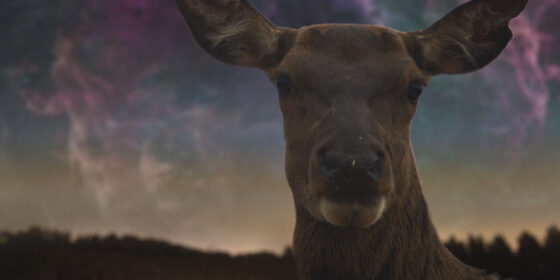TIFF 2022 | Stellar (Darlene Naponse, Canada) — Contemporary World Cinema

By Madeleine Wall
Stop me if you’ve heard this one before—a woman walks into a bar at the end of the world. The woman, simply known as She (Elle-Máijá Tailfeathers) settles down into a Northern Ontario dive bar for the evening, gradually noticing the young man He (Braeden Clarke) at the jukebox. As the weather outside the bar becomes stranger—most likely from the recently crashed meteor exacerbating the conditions of global warming—the two focus instead on their budding connections; the two hold even fast after their increasingly fearful bartender (Rossif Sutherland) leaves. With a roving cast of characters coming in and out of the storm, from white saviors to animals to ancestors, the two find their commonalities, and we end up with a cosmological love story.
Though Stellar seems to take place in our present, with smartphones pinging with bad news and the bar TV reporting more recent incidences of Indigenous protest and oppression, it’s not just the weather that is shifting. With the majority of the film’s action taking place in the bar, there’s a theatrical quality to the film; the characters gaze through a large window as the world changes, a screen within a screen. But director Darlene Naponse frequently intercuts the action with stock footage of nature, landscape, and industry, expanding on how He and She, just as they share backstories, have a mutual relationship tied to land that breaks away from the norms of Western narrative cinema. These two are good humoured in the face of catastrophe, and with their jukebox choices creating the contemporary pop soundtrack, Naponse lets her protagonists shape their world, and the film along with it.
Stellar is based on Naponse’s own short story, grounded in an Anishinaabe understanding of the world and our place in it. What’s happening? Our protagonists are asked. There’s only one answer: change.
Madeleine Wall

